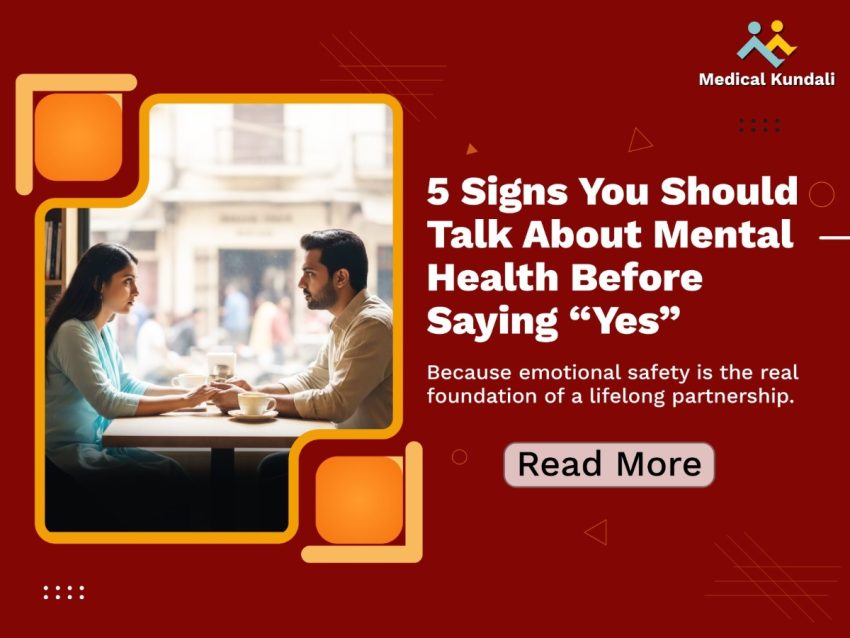Because emotional safety is the real foundation of a lifelong partnership.
Introduction: What You Don’t Discuss Can Quietly Shape Your Marriage
In many Indian families, marriage still comes with an unspoken rule: adjust kar lo.
But emotional struggles don’t adjust themselves — they show up in the form of withdrawal, conflicts, mistrust, and burnout.
One open conversation before marriage can prevent years of confusion after marriage.
This isn’t about judging someone’s past.
It’s about building a relationship where both partners feel safe, supported, and seen.
Here are five signs it’s time to slow down, talk honestly, and understand each other’s mental health needs — even when love is strong and families are aligned.
Sign 1: Either of You Has Experienced a Major Emotional Breakdown in the Past
This could include:
- A depressive episode
- Panic attacks or severe anxiety
- A long period of hopelessness
- Substance use, self-harm, or suicidal thoughts
None of these make someone “unfit” for marriage.
They simply deserve acknowledgment and care, the same way any physical health condition would.
Healthy questions to ask each other:
- What helped you recover?
- Did you seek therapy or medical guidance?
- How does stress affect you now?
- How supportive was your environment?
Just like a known medical allergy, mental health history helps your partner understand how to care for you – not judge you.
Sign 2: There Are Frequent Mood Shifts, Anger Outbursts, or Emotional Withdrawal
Occasional irritability is normal.
But patterns like these may signal deeper emotional strain:
- Intense highs and lows
- Long silent phases after disagreements
- Quick anger or irritation
- Blame, guilt-tripping, or avoidance
These could point to unresolved trauma, emotional dysregulation, or mood-related conditions.
This isn’t a sign to run away —
It’s a sign to talk gently, without shame.
Try saying:
“I care about us. I want to understand what triggers you and how we can support each other better.”
Sign 3: One or Both of You Grew Up in Emotionally Unsafe Homes
Your childhood becomes the blueprint of how you love.
If you experienced:
- Alcohol abuse or violence
- Emotional neglect
- Parents who avoided conflict or shamed emotions
- A home where mental health was dismissed
You may carry patterns like:
- People-pleasing
- Fear of commitment
- Passive aggression
- Suppressed sadness or anger
These patterns are not faults.
They’re simply reminders that healing and awareness are needed – not silence.
Sign 4: The Marriage Is Being Rushed — Leaving Little Room for Emotional Intimacy
Quick decisions may happen because of:
- Family pressure
- Social timelines
- Visa or relocation constraints
- Breakup rebounds
When there isn’t enough time to understand each other’s mental habits, coping styles, or stress responses, misunderstandings can grow.
A guided premarital mental wellness check helps you make a confident decision — not just a convenient one.
Sign 5: You’re Already Hiding Your Real Emotions
If either partner:
- Pretends to be “always okay”
- Avoids sharing fears or insecurities
- Hides past therapy or emotional struggles
- Laughs off anxiety, insomnia, or burnout
…it may mean emotional safety hasn’t been built yet.
Try saying:
“Can we talk openly about our mental health — not to judge, but to understand each other better?”
True partnership means accepting each other fully —
not just the easy parts.
If These Signs Feel Familiar — Here’s What to Do
1. Don’t panic. Don’t label.
Mental health is a spectrum, not a verdict.
2. Talk openly and gently.
Your goal is connection, not confrontation.
3. Consider a Mental Health Compatibility Check.
It helps both partners understand triggers, coping patterns, and emotional strengths.
4. Seek support early.
Therapy or counseling isn’t a “last resort” — it’s a proactive step toward a healthier marriage.
How Medical Kundali Foundation Supports You
At Medical Kundali Foundation, we ensure every couple receives confidential, culturally sensitive, science-backed help.
We offer:
✔ Private, judgment-free mental wellness screenings
✔ Tools that help couples explore emotional compatibility
✔ Certified counselors trained in Indian family dynamics
✔ Individual and couple mental mapping sessions
✔ College and community awareness workshops (Starting Aug 2025)
Your emotional health matters —
and your future deserves a strong, stable foundation.
Love Needs Mental Safety to Grow
Don’t wait for crisis.
Don’t rely on assumptions.
Don’t marry hoping problems will “fix themselves.”
Mental compatibility isn’t about perfection — it’s about preparedness.

